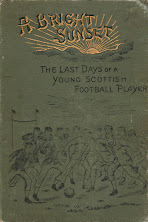Up next: Any recommendations from anyone?
The sleazy and corrupt side of the football agent business is something we have all grown to firmly believe in – Deadline takes this to the max in a fast moving story of dodgy deals in the English Premier League as Deadline Day looms. The author is Mesut Özil's agent so you have to assume a lot of inside knowledge went into this. There's kidnappings, henchmen, murders and sleazy lecherous men, as all the clichés are rolled out. It's an easy read, it will entertain most readers, but it’s not a book that will stay with you. It is also riddled with errors that a decent edit should have picked up: punctuation, grammar, missing words, spellings etc. It is also not terribly well crafted prose. But I suppose that doesn’t bother everyone.
https://footballbookreviews.com/reviews/book-review-the-lives-of-stanley-b-by-mat-guy
Did you know the first cup final at England’s new national stadium built in the 1920s was between Downside FC and Wildwood Town in front of 100,000 spectators? No? Then read on.
I don’t know why it took me so long to discover Sydner Horler – he was a fairly prolific writer of popular (some would say trashy) fiction in the early part of the last century. But it seems his books filled a certain gap in the market. It also has to be said that some of his views were pretty unpleasant and anti-Semitic. It raises that old conundrum about whether you can or should enjoy the work of someone whose views are abhorrent. I don’t have the answer.
Writing some thirty years after Association Football properly took off, Horler was clearly a fan and understood the game and penned several football stories. Take this, for example: “Goal!” Is there a more heart-warming cry in the world than that jerked-out word which signifies a football being deftly driven home? Certainly there is no word in our language into which is packed so much fierce joy, so much triumphant exultation, and so much strident challenge. It is the very flesh and blood of the game.
Angus McPhee (as with Goal!) could be regarded as full of footballing clichés, but being published in 1923 and 1920 respectively, they long-preceded all the Roy of the Rovers follow-ons. Although there was already an established tradition of short fiction in comics such as Boys’ Own Paper, he certainly seems to have been the first person to turn this kind of writing into long-form fiction.
McPhee is an easy read and full of dry wit in the style of Wodehouse. It draws on the growing folklore surrounding what was already by then a firmly embedded national obsession. For example, there are references to the legendary occasion where Sheffield United’s Harry Thickett played on despite having several broken ribs after just getting his chest heavily bandaged up. It is a must-read for any fan of the history of the game – if only for the history it contains.
So I have again had to revise previous calls of books being the first football novel: Goal! Is now the leading contender. It is not as good a novel as Angus McPhee – it is almost as if Horler was still getting his eye in. It is rather over-done in its deification of the amateur/gentleman player whose heroics on the pitch win the cup and off the pitch the girl. Nonetheless it is of interest historically if nothing else.
I was conned. Like the Victorian boy in 1884 who runs home from Sunday school clutching this book that he won as a prize, thinking he's got a cool book about football - the sport that is at the start of its boom as a pastime and spectator sport. He gets home and starts reading. Football is mentioned just once at the start when a schoolboy tells his mother he took a knock at school when playing the game. That is it. There follow 140 unreadable pages about how this pious boy suffers pain and slowly dies as he bears up terribly well because he gives himself to Jesus. 140 pages of the stuff! NOT a football novel. Anyone wanting to take it off my hands, feel free to get in touch.
The premise of this book is a strong
one – the exploitation of dreams of young African footballers
wanting to achieve fame and fortune in Europe, and the hardships and
abuse that can bring. Some impressive research has gone into the
book: on life in Abidjan, French football and the workings of agents
etc. There are some interesting ideas that Welsh has worked into the
plot, which is based largely around two young hopefuls: Ismail and
Habib.
That is about as far as it goes, alas.
The final novel turned out to be a bit of a mess. The author fell
into the trap of wanting to use all the research material, rather
than prioritising the plot and story, and ends up delivering lectures
on things like the agent and scouting system, French football
administration etc. Too many irrelevant characters are introduced and
described, such that the reader starts to despair as the main plot is
ignored and you disappear up another dead end: we do not need to know
the back-stories of every minor character in a book. The writing is
ugly at times – like that written in a council committee report on
housing benefit or something. Then it is riddled with mistakes:
typos, punctuation, missing words etc.
It is a shame because with a bit more
thought and attention this could have been a good read. Stick to
Belly of the Atlantic if this subject matter interests you.







